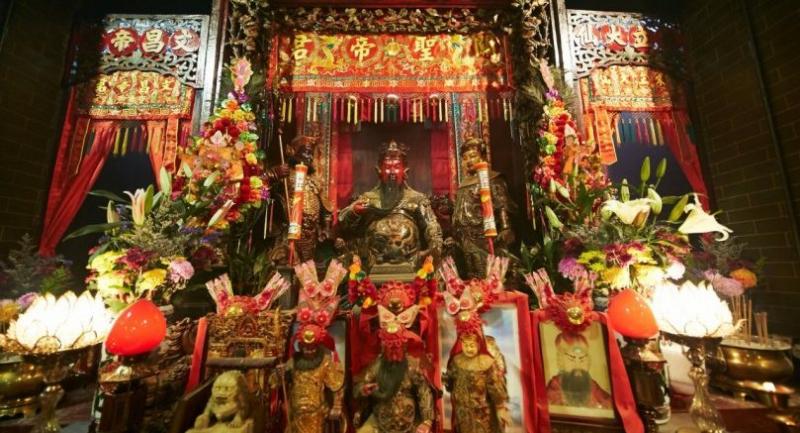For the soul and the stomach

A recent trip to Hong Kong takes in the temples and the Michelin-starred restaurants
HONG KONG is well known and loved as a shopping and entertainment paradise but it is also an important destination for those wanting something a little more spiritual from their visit.
Temples are everywhere in the SAR, the loud prayers and the heavy scent incense wafting into the street testament to the Chinese love for paying respect to their deities.
The Mall Group recently held an exclusive trip for its M Card members, organising it in such a way as to allow the Thai visitors to experience another side to Hong Kong. Dubbed “Unseen Hong Kong”, the trip was led by Voralak Tulaphorn, chief marketing officer and well-known feng shui master Khatha Chinbunchorn and took in not just the power of Taoism but also some of the SAR’s Michelin-starred Chinese restaurants.

The secret chamber at Wong Tai Sin Temple
The itinerary highlighted five temples, among them the secret underground room of 60 Chinese Wealth Deities (Cai Shen Ye) at Wong Tai Sin temple in Kowloon.
“The underground room is rarely open to the public but feng shui enthusiasts will be delighted to learn that the room was designed to represent the complete and perfect world of feng shui beliefs,” Khatha told participants.
“It features a beautifully decorated night sky with each of the stars positioned as a specific Chinese Wealth Deity, The splendid Highest Deity (Ming Ming Shangdi) illustrates 12 stars clusters and 60 Chinese deities, and on the ground represents Yin Yang and eight tri-grams (Bagua), which comprise eight directions and five geometric elements – water, wood, fire, earth and gold. The room is thus considered the assembly point of the power of gods.”
Apart from praying for good fortune and divine guidance through offerings, Khatha recommended that participants, especially those not having a “lucky” year, follow the Chinese tradition and pay respect to the deities in the chamber.
“Wong Tai Sin temple is home to three religions; Taoism, Buddhism, and Confucianism. It is the residence of many gods from Wong Tai Sin, Kwun Yum, the guardian spirit, Yue Lao (God of Marriage and Love), and Kong Qiu (Confucius). The year 2018 is the earth element year of the Dog, and the deity of this year is the God of destiny warlord, Butai shengong, the 35th deity of the Phoesuk year. Those who should pay respect to the deity include people born in the year of Dragon, Dog, Goat and Ox,” he explained.

Kwan Yum Temple
Kwun Yum Temple, built in 1873, in bustling Hung Hom is the residence of the God of Mercy, Kwun Yum or Guan Yin. The temple is believed by Hong Kong people to have the power to revitalise the economy.
“Worshippers, mostly businessmen, pray here to borrow money from the goddess and invest it in their businesses. If successful, the borrower would come back to return the money,” Khatha told the group.
“Having some struggles in life is normal but you wish the power of faith will ease those problems or help you find solutions and go through it as quickly as possible.”
Continuing to pay their respects to Kwan Yum, the group was then taken to Tin Hau Temple at Yao Ma Tei. Tin Hau, Goddess of the Sea, is revered by fishermen and anyone whose life and destiny are tied to the ocean. Temples that honour her are found in abundance in Chinese coastal communities throughout Asia, including in Thailand, where believers flock to the riverfront Lhong 1919 in Khlong San district to pay their respects.
Known to almost all Thai visitors, Che Kung Temple’s windmill is said to blow away bad things in life. It is believed that rotating the windmill clockwise would change one’s life from bad to good. The lucky windmill enhances good luck, prevents unfortunate events, and ensures victory.

Che Kung Temple
It doesn’t mention bringing worshippers the finest dining but that’s precisely what the group enjoys next as Voralak leads the way to the legendary congee restaurant at Ho Hung Kee. The house offers speciality Wonton noodles in soup and fragrant minced fish balls with clams Cantonese style. The rice noodle rolls filled with twisted cruller are a must.
The group also eats at the Michelin-starred Lei Garden restaurant, a 40-year-old dining establishment that offers Double Boiled Soup of the Day, BBQ Pork and crispy roast pork belly. The sauteed scallop is simply delicious.
Lung Tang restaurant is another well-kept secret. Located in the fish market, it’s well known for its fresh ingredients and countless seafood dishes.
